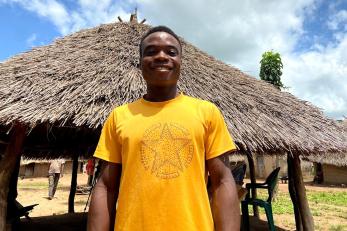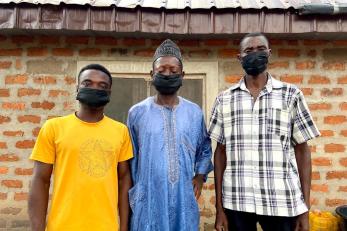Nurturing the inclusion of youth in peacebuilding

In a farming community in Makurdi Local Government Area (LGA) of Benue state called Uchen is 25-year-old Kelvin Chikpi Benson, a participant of CIPP’s supported mediation activities, who was appointed the secretary of the community’s peace committee that meets at the end of every month. According to Kelvin, “After we returned from the training in Makurdi, the community elected me to be the secretary of the committee and I am responsible for taking the minutes of the meeting.”
Since becoming secretary, Kelvin has taken an active role in helping to resolve disputes in Uchen. Worthy of note as well, is the role Kelvin plays in being a positive role model to young people in his community. According to Kelvin, there was an uprising brewing among young people in Uchen who wanted power vested to them by the elders. “Of recent, youths in this community have started misbehaving, saying they should be given the leadership and that it is unfair that only the elders in the community have any sort of power. Thankfully we were able to intervene and apply some of the skills we learned to calm them down. It was getting so bad that crisis would have occurred between youths and elders in the community, but we were able to explain how these things (succession) work and how the elders didn’t come into power through force, it was passed onto them, and so they should calm down and the time will come when they too will be in power” Kelvin said. “The elders also promised that if they calm their tempers, power will be given to them based on merit. Since then, the situation with the youths has calmed down” he added.
I’ve also been able to leverage my participation in Mercy Corps’ activities to advise my younger ones and other youths about the importance of peace using myself as an example as I don’t get into trouble and won’t be found in a police station for bad” he added.

Sharing some of the ways in which he has contributed to the conflict resolution process in his community, Kelvin spoke of his involvement in resolving a land dispute between two farmers in the community. According to him, two people laid claim to a piece of land, each claiming the land belonged to their forefathers. Person A had sprayed the land with pesticide ahead of his planting activities while person B went ahead to farm on the same plot of land, leading to conflict between both farmers. The case had already gotten to the police station before Kelvin and the committee intervened and spoke to both parties. “We traced the ownership of the land and found out that the true owner was person A whose forefathers owned the land and we used that to settle the matter once and for all,” Kelvin said.
CIPP is addressing the confidence and credibility crisis currently plaguing the youth, especially in conflict and post conflict settings. In most cases, they are the perpetrators of conflict and violence. They have no say in their communities which in turn affects their confidence, credibility, leadership, and access to resources. Kelvin is an example of a young person who has earned credibility and increased confidence thanks to CIPP supported activities.
About Interest Based Negotiation and Mediation
Most of the conflict situations in which Mercy Corps operates require substantial negotiation, which we define as back-and-forth communication looking toward agreement where some interests are shared or different. Interest-Based Negotiation (IBN) is a process that enables traditional negotiators to become effective problem solvers. This approach separates the people from the problem, focuses on the interests and not the positions, creates options for mutual gain and defines objective criteria against which to judge the fairness of the end agreement. Mediation is assisted negotiation through the help of a neutral third party (i.e., a mediator) where community leaders and institutions use the negotiation framework to help parties resolve their disputes.
About CIPP
Mercy Corps is implementing the Community Initiatives to Promote Peace (CIPP), a five-year peacebuilding program funded by the United States Agency for International Development (USAID).
CIPP’s aim is to prevent violent conflict in the most at-risk communities across Katsina, Kaduna, Plateau, Kogi, Kano and Benue states in Nigeria’s North-West and Middle Belt regions. CIPP works with community leaders, women, government officials, and state-level actors to improve their ability to peacefully manage disputes. CIPP also works to strengthen Early Warning and Early Response (EWER) mechanisms for timely response to violent conflict and facilitate collaboration among communities with government agencies, civil service organizations, and local leaders to address root causes of conflict.
CIPP is implemented in partnership with Pastoral Resolve (PARE), Interfaith Mediation Centre (IMC), Savannah Centre for Diplomacy, Democracy and Development (SCDDD), and the African Radio Drama Association (ARDA).